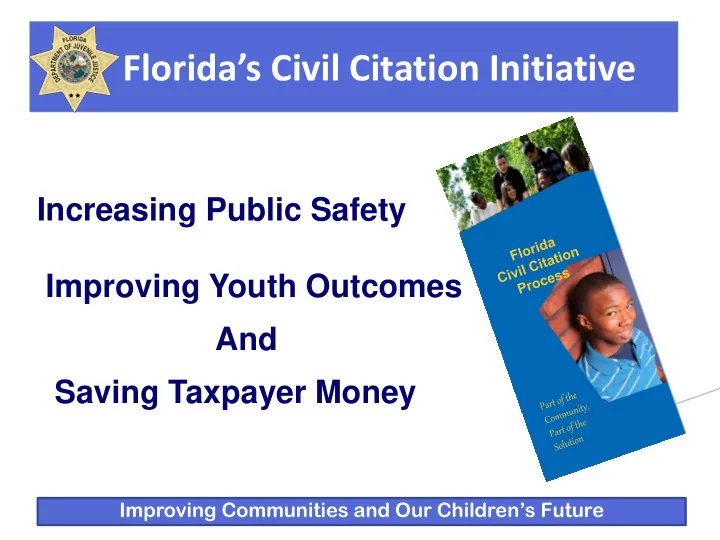

Florida’s Civil Citation Initiative Increasing Public Safety Improving Youth Outcomes And Saving Taxpayer Money Improving Communities and Our Children’s Future
Florida’s Civil Citation Initiative Section 985.12, Florida Statutes, Civil Citation Mandates local civil citation Requires the concurrence of the chief judge, state attorney, public defender, and law enforcement Limits eligibility to first-time, nonviolent misdemeanants Authorizes DJJ to assist in implementing or improving civil citation Provides that youth are assessed for services Requires civil citation data be provided to DJJ Stipulates that youth must admit guilt and can refuse participation
Florida’s Civil Citation Initiative Process Law enforcement may deliver a youth to a juvenile assessment center or issue a field citation DJJ determines eligibility for civil citation Youth and parents contact the local coordinator within seven days Youth is assessed to determine service needs Youth data is entered into the Juvenile Justice Information System The local coordinator provides case management Successful youth have no arrest record If unsuccessful, the original delinquent act is reported to the state attorney
Florida’s Civil Citation Initiative Sanctions Up to 50 community service hours Restitution Letter of apology School progress monitoring Intervention services Substance abuse or mental health services Youth and Family Counseling Teen Court Urinalysis Monitoring
Florida’s Civil Citation Initiative Benefits Successful youth have no arrest record to impede military, educational, or employment opportunities Youth is held accountable with swift and effective sanctions Services are provided to the youth and family that specifically address behavior The cost of processing youth in various systems is reduced Youth outcomes are improved Disproportionate minority contact and school arrests are reduced Keeps youth that pose no real threat to public safety out of the juvenile justice system Frees up limited resources to focus on more serious, violent offenders
Florida’s Civil Citation Initiative
Florida’s Civil Citation Initiative Challenges • Appearance of being soft on crime • Perception of civil citation as a threat to existing diversion programs • Law Enforcement buy-in • Record confidentiality
Florida’s Civil Citation Initiative Florida’s Fiscal Year 2011 -12 58,173 youth were referred to FDJJ 30,715 (53%) of those committed misdemeanors 26,210 (45%) were first time misdemeanors Youth who committed misdemeanors 6,964 (26%) of eligible youth received a civil citation Youth who committed other offenses
Florida’s Civil Citation Initiative Increases Public Safety Communities are safest when low-risk youth are diverted from the juvenile justice system entirely, and re-arrest rates are much higher for youth committed to residential than for youth supervised on probation. ONE-YEAR RE-ARREST RATES FOR LOW-RISK YOUTH A recent study 51% 50% found that low-risk 48% 44% 43% youth are much 35% more likely to re- 31% 28% offend if they are committed to residential programs or placed in intensive interventions designed for high- risk youth.
Florida’s Civil Citation Initiative Improves Youth Outcomes
Florida’s Civil Citation Initiative Saves Taxpayer Money • The cost of processing one youth through Law Enforcement, the State Attorney, the Public Defender, juvenile probation, and the Court $5,000 • The cost to process a youth through a Juvenile Assessment Center $386 • Number of youth receiving a civil citation in 2011-12 6,964 • Estimated cost savings of implementing civil citation in FY 2011-12 $32 M 11
Florida’s Civil Citation Initiative 12
Florida Department of Juvenile Justice The right combination of services and sanctions, in the right place, at the right time, to care for each youth and keep the public safe.
Recommend
More recommend